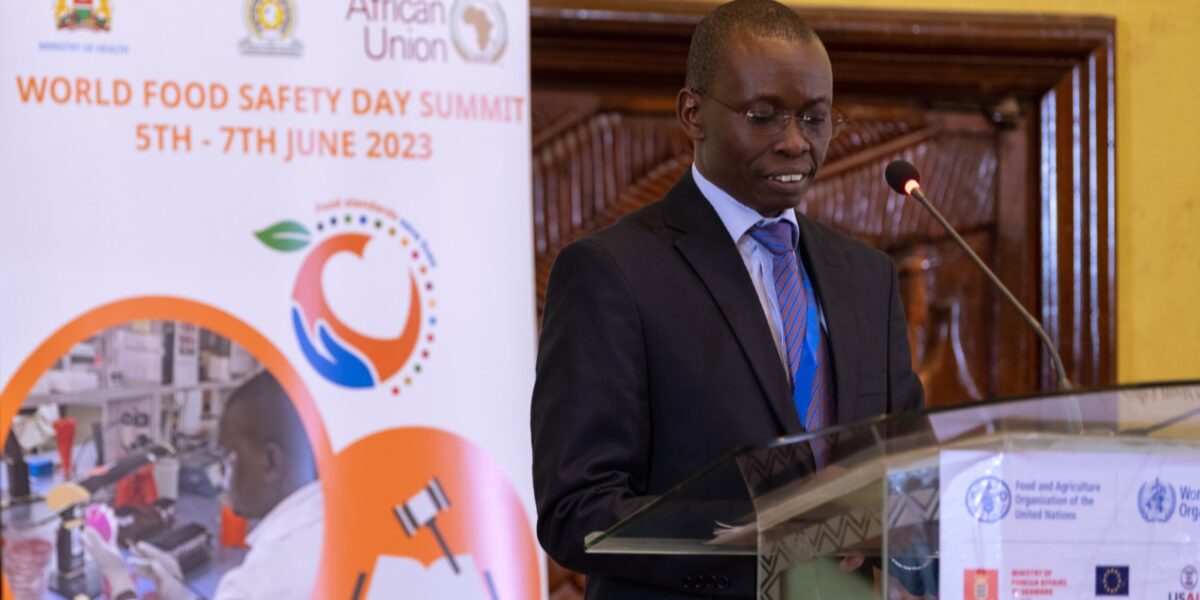From the 5th to the 7th of June 2023, Nairobi, Kenya, played host to the World Food Safety Day (WFSD) Summit, organized by the African Union Commission (AUC), East Africa Community (EAC), TradeMark Africa (TMA), Concern Worldwide, Micro Enterprises Support Programme Trust (MESPT) and other partners. This significant event provided a crucial platform for African countries to dialogue, share best practices, and enhance their capacity to address food safety challenges on the continent. It was an occasion to commemorate the United Nations General Assembly’s adoption of June 7th as World Food Safety Day in 2018—a day dedicated to raising awareness and taking action to prevent, detect, and manage foodborne risks.
The 2023 World Food Safety Day theme, “Food Standards Save Lives,” underscored the paramount importance of food standards in ensuring the safety and quality of food products. Robust food standards, guidelines, and codes of practice are pivotal in fostering safety, quality, and fairness in international food trade. They instil confidence in consumers who can trust the safety and quality of the food they purchase. At the same time, importers can be assured that the food they order adheres to their specifications and is safe for consumption. Public concerns around food safety issues, including veterinary drug residues, pesticides, food additives, and contaminants, are frequently the focal point of discussions at the national, regional, and international debates. Adherence to these standards is crucial for protecting consumers from foodborne illnesses and guarantees the quality of food products.
Efforts to ensure food safety encompass a range of actions and controls that must be integrated cohesively. Effective food safety control requires having in place a policy framework consisting of laws, regulations, and standards, coupled with the infrastructure and capacity for testing, inspection, certification, market surveillance, data generation, research, awareness, monitoring, and enforcement in a coordinated and integrated approach by all the entities and stakeholders involved. Furthermore, food safety interventions should not exist in isolation but should be linked to food security, trade, health, environmental protection, and sustainable development. Integration with trade requires transparently implemented policies and procedures supported by data.
The WFSD 2023 Summit aimed to increase awareness of the importance of food standards in safeguarding consumer health and facilitating trade. The conference convened stakeholders from the entire food chain, advocating for safe food practices and making a compelling case for integrating food safety into diverse food systems encompassing plant- and animal-based foods.
Specifically, the WFSD 2023 Summit in Africa aimed to:
- Raise awareness of the importance of food safety and promote action to prevent, detect, and manage foodborne risks;
- Provide a platform for sharing experiences and best practices on the implementation and compliance with food safety standards and measures; and
- Foster collaboration and partnerships among stakeholders to amplify the impact of food safety interventions in Africa.
The World Food Safety Day commemoration outcomes were transformative, with a shared understanding and appreciation of the need to prioritize safe food production. The summit emphasized the urgency of developing innovative approaches to raising food safety standards and regulations in Africa’s formal and informal food sectors. These efforts aim to diversify Africa’s food baskets, increase nutrient bioavailability, significantly reduce food insecurity, and boost intra-African trade.
The Summit brought together 220 participants from 30 African Union member states, 2 RECs (EAC, ECOWAS), AUC, and Development Partners. The signing of a joint Communiqué by the Government of Kenya, the EAC, ECOWAS, and AUC outlining commitments to promote food safety through a comprehensive call to action on various food safety fronts was a key highlight of the conference. Key commitments adopted at the event include:
- Enhancing participation in international standard-setting bodies by improving AU member states’ engagement in international standard-setting bodies to contribute effectively to the development of food safety standards;
- Increasing investment in food safety, including capacity building for value chain actors, to manage risks and ensure compliance with food standards.
- Improving surveillance and monitoring systems by improving laboratory capacity, data collection, analysis, and reporting to strengthen foodborne surveillance and monitoring.
- Promoting research on food safety by encouraging and supporting research initiatives focused on developing new technologies, methodologies, and best practices to enhance food safety management systems and mitigate foodborne risks.
- Supporting policy implementation at the continental, regional, and national levels to ensure the implementation of food safety policies, frameworks, and strategies.
- Strengthening regulatory mechanisms by developing and enforcing robust food safety policies, regulations, and standards to enhance regulatory mechanisms.
- Promoting collaboration among African Union member states to enhance food safety practices, facilitate trade, and establish partnerships and knowledge-sharing networks.
- Establishing public-private partnerships to facilitate knowledge transfer, technology adoption, and joint initiatives in food safety throughout the value chain.

